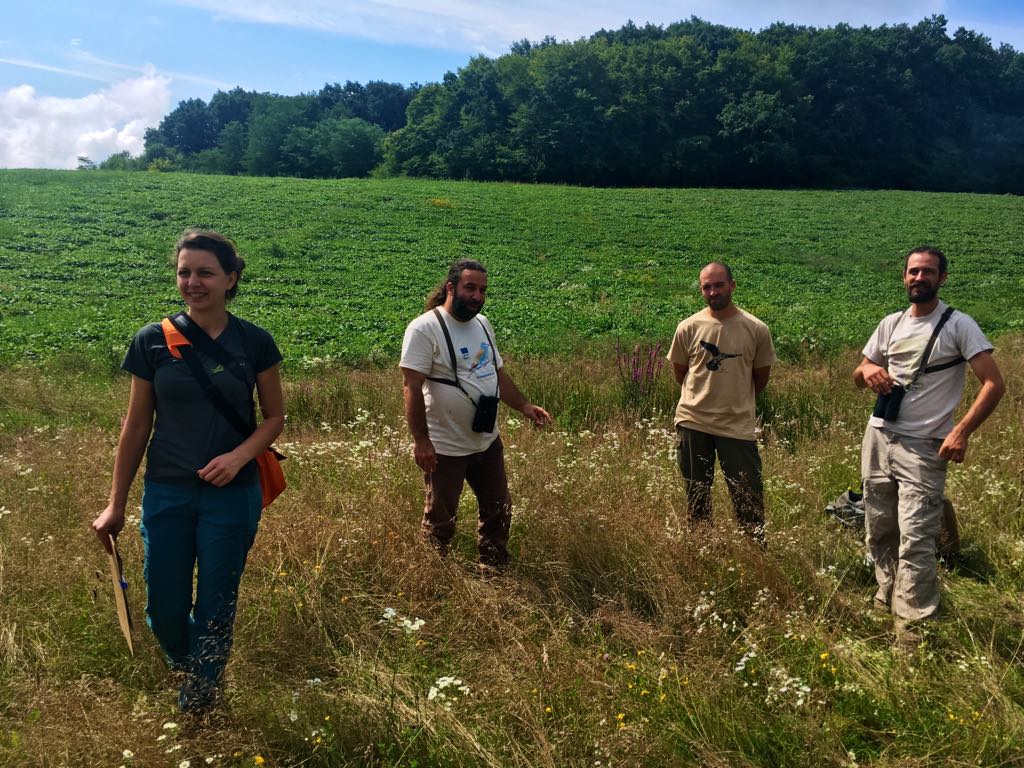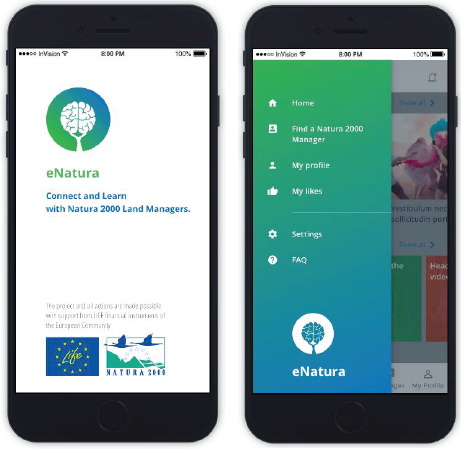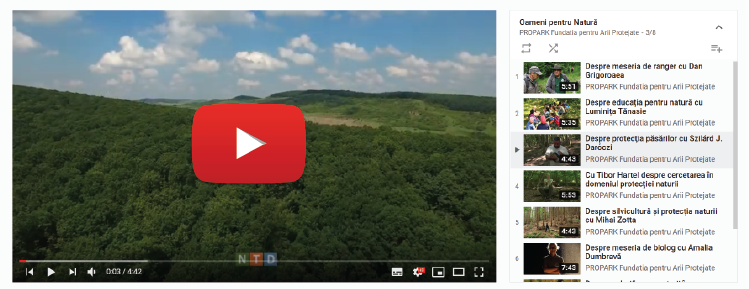What are the Competencies for effective management of Natura 2000 sites?
Capacity Building project - First Training Programme 2015 © Propark Foundation for Protected Areas
Natura 2000 site managers come from a very wide range of domains and have quite different backgrounds. Some of them are protected area managers, others are forest landowners, with many other occupations in-between. What they all have in common are the responsibilities to contribute through their Natura 2000 activities to maintaining or improving of the conservation status for the species and habitats for which these sites were designated.
Article written by Erika Stanciu
Director of ProPark Foundation for Protected Areas in Romania
What are the Competencies for effective and efficient management of Natura 2000 sites?
There are many possible answers if one raises the question: what are the top five or ten things you have to know very well as a Natura 2000 site manager, what should you be able to do and what should be your attitude to solve the challenges for species and habitat conservation in your area? Or to shorten the question: what are the competencies you need to do your work in an efficient and effective manner as a Natura 2000 manager? Many different answers are possible.
These answers can be grouped under a list of competencies that are relevant for most people involved in Natura 2000 management. Such a pre-defined list of competences is the starting point for a better understanding and knowledge about the needs of site managers and can help to plan and develop well-targeted capacity-building events and materials and to provide guidance and support for most of those who manage Natura 2000 sites.
A team of enthusiastic professionals gathered under the umbrella of the ‘LIFE e-Natura2000.edu: supporting e-learning and capacity building for Natura 2000 managers’ project to define a list of competencies that are needed for the management of Natura 2000 sites. This list, built on the IUCN’s Global Register of Competencies for PA Practitioners (2016), can be used by site managers to learn about their needs to improve competences for their jobs, for their every day work.
An online Training Needs Assessement
A first step in using the list of Natura 2000 competences was already taken within the Life e-Natura2000.edu project. A practical tool was developed for the use of individuals engaged in the management of Natura 2000 sites, an online Training Needs Assessment for Natura 2000 site management (Online Natura 2000 TNA).
If you are one of the professionals targeted by this online tool or a Natura 2000 landowner who has the responsibility to manage species and habitats on your land according the requirement of the Habitats and Birds Directives, you might find this tool very useful.
The analysis can show you which are the topics where you should invest more efforts in learning and in acquiring the practical skills you need.
With your top needs identified, you can then turn to your employer and ask for support in developing your professional capacities or to design a plan for learning by yourself. By offering the list of topics in which you need further improvement of your professional competences for further analysis, you will help training organisation and institutions to provide materials and tools for developing capacities of Natura 2000 managers.
After the testing phase of the Online Natura 2000 TNA all those interested in assessing their competences will have access to this individual tool.
”People for Nature” – ProPark honours people’s contribution to nature conservation
What does it mean to be a park ranger? How could forest management support conservation? Can we rely on nature to restore our health? What does experiential education for nature mean? What is the role of a park biologist? These are some of the questions the 8 short films “People for Nature” produced by Propark Foundation address.
Article written by Alina Ioniță
Nature conservation expert, the initiator and mastermind of ”People for Nature”
”People for Nature” – ProPark honours people’s contribution to nature conservation
Nature conservation’s success relies on the motivation, professionalism, dedication and actions of people working in this field. Given its complexity, this sector gathers people with a great diversity of educational backgrounds, professional and personal interests, competencies and life stories. This results in a captivating and inspiring mosaic of perspectives and ideas about conservation work itself.
Furthermore, in nature conservation work, our professional competencies intertwine with our beliefs, passion and dedication, our personal experiences and insights, giving a personal touch to our work and fuelling it. This fascinating intertwining is the cornerstone for this project.
But do we make time and space to talk about such things? How often do we reflect on our passions, our motivations, what determined us to work for nature, our “heroes” who inspired us along the way? How often do we talk about our daily work activities and how these contribute to society, or about our appreciation for our peer’s work? And how often do we even share our conclusions publicly or within our community of practice?
‘People for Nature’ brings the missing ingredient – a ‘melting pot’, a space – be it virtual or metaphorical – for sharing, for reflection and debate.
The aim is to contribute to fostering public support for the conservation sector in Romania. By focusing on people and honouring their contribution, by showcasing the beauty, the complexity and originality of different occupations we want to ignite the public’s curiosity and enable them to understand the importance of this sector for our well-being.
Moreover, the examples and insights of remarkable and authentic professionals are the building blocks for the developing community of practitioners who can inspire the new generation.
The series is continuously developing and it currently includes 8 short films, produced by Propark Foundation for Protected areas in Romania in collaboration with NTD Films. What does it mean to be a park ranger? How could forest management support conservation? How can we value nature to keep and restore our health? What does experiential education for nature mean? What does a park biologist do? What does an ornithologist do for nature conservation? How can conservationists work with the business sector to balance conservation and development? These are some of the questions the films are addressing by using the amazing power of image and sound.
The blog complements the films as a space for sharing personal stories and insights (in Romanian language only)

Coming soon: a smartphone APP for Natura 20000 managers!
The LIFE Preparatory project, LIFE e-Natura 2000 Natura2000.edu, is creating a new Smartphone App to enable Natura 2000 site managers and private landowners to connect with each other. The App will enable users to discuss issues (and sometimes difficulties) that arise in the management of Natura 2000 lands. This practical tool will enable Natura2000 land managers to network across regions, countries, and land types.
The digital app will help Natura 2000 managers to identify issues, solve common problems that they face, communicate with each other directly, as well as learn about their professional development needs: for example, the App will act as a portal to a new online Natura 2000 Training Need Assessment (TNA) tool as well as a variety of other useful resources on the projects webpages.

App users will be able to create ‘self-profiles’ with their background, experience, areas of expertise and interests.
App users can identify individual Natura 2000 site managers and interact with other users based on the individual profiles, as well as by biogeographical zones, countries, and languages.
The App will follow all GDPR requirements and be representative of LIFE project’s goals and initiatives. Initial testing has already begun. The App will be presented at the Forum for the Future of Agriculture on March 31st, in Brussels, where interested participants can sign up to download the app and staff from project partner ELO will be available to answer questions and demonstrate it first-hand.
If you have any questions about the App or suggestions on features that interest you, please let us know. If you’d like to experience the App when it’s ready, contact Daniel.monteleone @ elo.org and you’ll be notified as soon as the innovative digital tool is released.
“Natura 2000 in practice” Spring School
“Natura 2000 in practice” Spring School
The Spring School will take place between 6 and 10 April in Italy. It aims to disseminate in-depth knowledge on innovative aspects related to the management of Natura 2000 sites and develop technical skills together with participants on the ecological and planning tools towards the appropriate management of these protected areas. Therefore, it is an integral part of the LIFE e-Natura2000.edu project and enables managers to connect with peers.
Lectures will be carried out at the Agripolis Campus of the University of Padova and in two Natura 2000 sites: the Euganean hills (IT3260017 “Colli Euganei – Monte Lozzo – Monte Ricco”), that are also part of the homonym regional park, and the Bosco Nordio integral natural reserve (IT3250032 “Bosco Nordio”). The context of these two sites includes semi-natural habitats, agricultural and industrial developments, community settlements, and tourism services. This makes for a useful case for the management of Natura 2000 sites and related ecosystem services. The field visits will function also as a “hands on” management solutions and will enable attendees to share their experiences and concerns.

The Spring School lectures will have an interdisciplinary approach, during which active participation will be prioritised through discussions and facilitated group-work sessions. In-depth information will be given for the main concepts related to Natura 2000 management (e.g. conservation status and degree).
Linked to these relevant features, theoretical and practical information on different tools and approaches for the identification of ecological indicators, management prioritisation, ecological risk assessment, monitoring protocols, engagement strategies and participative approaches will be discussed. We will use group-work and case study examples to consider how to apply best practices in Natura 2000 sites ‘on the ground’.
This new Spring School is organised by the Department of Land, Environment, Agriculture and Forestry of the University of Padova (TESAF), EUROPARC and the project partners of “LIFE e-Natura2000.edu: supporting e-learning & capacity building for Natura 2000 managers” (LIFEedu for short).
